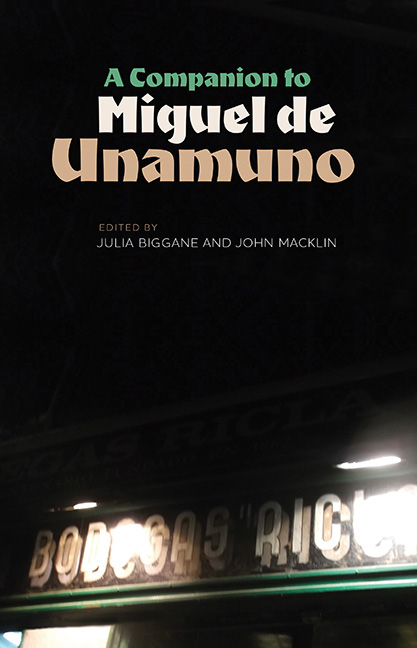10 - Quixotic Unamuno: Cervantes in Unamuno’s Thought and Fiction
Published online by Cambridge University Press: 21 May 2021
Summary
A defining feature of the early-twentieth-century Spanish writers known as noventayochistas (the ‘Generation of 1898’) is their auto-didacticism, the wide cultural, philosophical and scientific knowledge they each acquired by reading independently and eclectically. Unamuno's philosophical and literary works are particularly rich in allusions, references to and influences from classical and contemporary authors. Of course as a professor at Spain's oldest university, Unamuno had access to one of the largest libraries in the country, but his intellectual curiosity also led him to purchase a large quantity of books published abroad, some of which included works in German philosophy and Scandinavian literature, which were little known by his fellow countrymen. Indeed, the rich intertextual dimension of Unamuno's works is perhaps unparalleled in the literary and philosophical history of modern Spain.
Barry Luby (2008: 13) has suggested that Carlyle, Kierkegaard and William James were the three philosophers that exerted the deepest influence on Unamuno; in his 1913 article ‘La Generación de 1898’, Azorín (1969: 39) thought that Ibsen, Tolstoy and Amiel were the foreign authors that had marked Unamuno's literary works most profoundly. To condense Unamuno's intellectual influences into a list of a few authors would decidedly misrepresent the scope of his intellectual ambitiousness, but perhaps Kierkegaard and Ibsen are the authors with whom he felt the most passionate or sympathetic affinity; within Spain, Ganivet and Galdós are perhaps the authors who most inspired his literary development. Yet one obvious name is absent from Azorín and Luby's lists—Cervantes. His masterwork Don Quixote is clearly at the centre of Unamuno's philosophical and literary production. The Cervantine elements in Unamuno's work have been competently studied by several scholars. However, as is the case with many other aspects of Unamuno's works, his thought and his creative writing have often been studied in isolation from each other. This chapter examines Cervantes's presence in both Unamuno's essays on ontological and historical questions, in his literary output and the way he conceived the novel.
Popular and scholarly interest in Cervantes and Don Quixote had been growing in Spain since the second half of the eighteenth century, and the tercentenary of the publication of part I was one of the factors that further renewed its currency in the early 1900s: the novel was appropriated by intellectuals in diverse ways to (re)assess Spain's modern history and to envisage possible future directions for the nation.
- Type
- Chapter
- Information
- A Companion to Miguel de Unamuno , pp. 197 - 208Publisher: Boydell & BrewerPrint publication year: 2016
- 1
- Cited by

